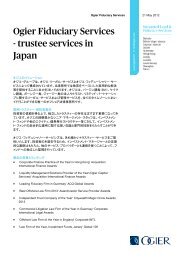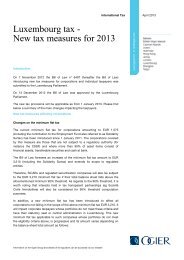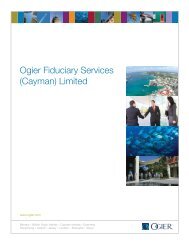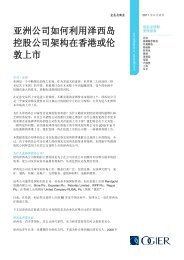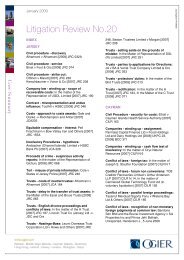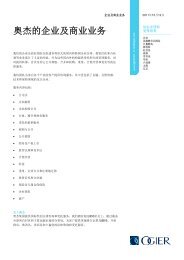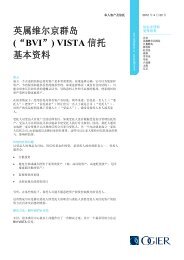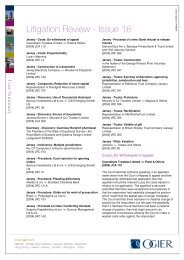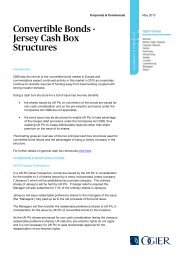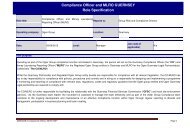Litigation Review - No. 19 - Ogier
Litigation Review - No. 19 - Ogier
Litigation Review - No. 19 - Ogier
You also want an ePaper? Increase the reach of your titles
YUMPU automatically turns print PDFs into web optimized ePapers that Google loves.
April 2008<strong>Litigation</strong> <strong>Review</strong> - <strong>No</strong>. <strong>19</strong>Case SummaryPrescriptionPell Frischmann Engineering Limited v BowValley Iran Limited & Ors [2007] JRC 105AThis case is the first in which the Royal Court dealt withissues of limitation in relation to the cause of action ofbreach of confidence and offered a view as to whetherthe equitable doctrine of laches applies in Jersey.The Court held that issues of limitation are treated asbeing procedural under Jersey and English law andtherefore governed by the lex fori (in this case, Jerseylaw). It went on to clarify the law on limitation in relationto actions for breach of confidence in Jersey, holding thatthe limitation period for such a cause of action is tenyears.The Court also accepted that the doctrine of laches or itsequivalent could operate in Jersey so that in certaincircumstances, a plaintiff may be refused some particularform of relief notwithstanding that his claim is not timebarred,but declined to express any precise formulation ofthe principle (as it had not been fully argued).Strike Out - DelayLescroel v Le Vesconte [2007] JRC 091Rule 6/26(13) provides that if two months have elapsedfrom the time limited for filing pleadings and no summonsfor directions has been issued, the Court may, of its ownvolition, having given not less than 28 days notice inwriting to all parties, order the dismissal of the action.The Court held that when considering whether to dismissan action pursuant to this rule, the Master shouldconsider the following.• Has the plaintiff satisfied him that, apart from the failureto issue a summons for directions as required by Rule6/26, he (including his advisers) has prosecuted hiscase with at least reasonable diligence, so that overallhe is innocent of any significant failure to conduct thecase with expedition?• Has the plaintiff satisfied him that, in all thecircumstances, his failure to apply for a summons fordirections is excusable and should be forgiven?• Has the plaintiff satisfied him that the balance of justiceindicates that the action should be allowed to continue?If the answer to any of these three questions is no, thiswill point towards dismissal of the action.As the Royal Court Rules are currently drafted, a decisiontaken by the Master to dismiss an action under Rule6/12(13) is a judicial act even in those cases where nosummons in response to the circular has been issued bythe plaintiff with the consequence that the Master hadheard no argument on the question of whether the actionshould be permitted to continue. This means that anADMIN-14369297-2appeal to the Court is currently the only available route forthe strike out to be reviewed. The Court held that thiswas undesirable and necessitated a change in the Rules.Strike Out - no reasonable cause ofaction/frivolous or vexatious/abuse ofprocessTrant v A.G. [2006] JRC 172The Attorney General made an application to strike outthe order of justice of the plaintiffs pursuant to Rule6/13(1)(a) and/or (b) and/or (d) of the Royal Court Rules(as amended) on the grounds that it disclosed noreasonable cause of action, was frivolous or vexations orotherwise an abuse of process. The plaintiffs soughtdeclaratory relief to the effect that inter alia they could notbe compelled to attend or give evidence in and couldvalidly claim the privilege against self-incrimination inrespect of criminal proceedings in Jersey which had beencommenced by the Attorney General against two otherparties who were accused of laundering money resultingfrom the criminal conduct of the plaintiffs.The court emphasised that on an application to strike outon the ground that there is no reasonable cause of actionevidence is not admissible, whereas on an applicationbased on the ground that the order of justice isscandalous, frivolous or vexatious or an abuse of processor where the application to strike out is made out underthe inherent jurisdiction of the court, evidence isadmissible and may be considered by the court.It struck out all claims made in the order of justice otherthan the plaintiffs’ claim that the statements obtained fromthem were obtained unlawfully as a result ofmisrepresentation on behalf of those representing theAttorney General and that, as a result, they had a claimagainst the Attorney General for misuse of privateinformation, breach of confidence and/or abuse of power.It did so even though the plaintiffs had failed to put inevidence dealing with this key aspect of the claim.Trusts - foreign orders re Jersey trustsIn the matter of the B Trust [2006] JRC 185This decision was the first decision of the Royal Court inrelation to the new Article 9 of the Trusts (Jersey) Law<strong>19</strong>84 (as amended) (“the TJL”). The trustees of the BTrust applied to the Royal Court for directions in relationto the administration of the B Trust following an order ofthe Family Division of the High Court in England inmatrimonial proceedings between two beneficiaries of thetrust, varying the terms of the trust as a post-nuptialsettlement in the wife’s favour. The trustee had submittedto the jurisdiction in the English proceedings and it soughtdirections as to how it should respond to the Englishorder.The trustee argued that the Court should give effect to theEnglish order. The husband resisted this on two grounds:



